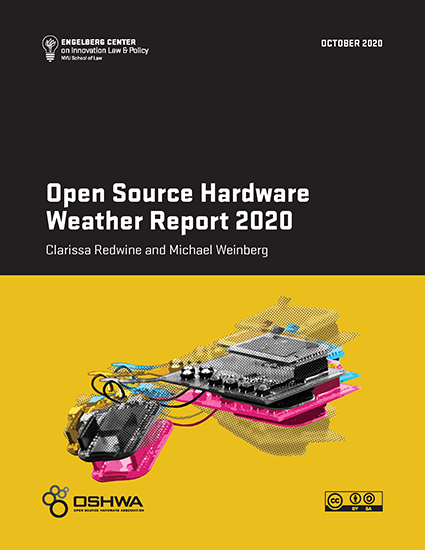This post originally appeared on both the Engelberg Center and OSHWA blogs
Today the Engelberg Center, in collaboration with the Open Source Hardware Association (OSHWA) is thrilled to release the 2020 Open Source Hardware Weather Report. The report is a snapshot of the open source hardware community as it exists in 2020, ten years after the first Open Hardware Summit. It helps existing members of the open source hardware community take stock of where it is, and new members of the community understand the state of affairs today.
The open source hardware community has grown tremendously in the past decade. That growth is a testament to the viability of the idea of open source hardware. It can also create challenges when the community wants to talk to itself - let alone create welcoming pathways for new community members.
The 2020 report allows the open source hardware world to collectively identify what is working, share insights, and rally around shared challenges. It distills lessons learned and describes the collective understanding of the state of open source hardware. The report provides guidelines for how open source hardware can be a viable approach to hardware development, as well as identifies situations where open source hardware may not be the strongest approach. It also examines challenges that remain unresolved in 2020, along with opportunities for open source hardware in the future.
Like any weather report, this document is a snapshot of a moment in time. It was originally intended to flow from an in-person workshop held in connection with the tenth anniversary Open Hardware Summit here at the Engelberg Center. When the Summit went virtual, that workshop transformed into a series of interviews with a cross section of the open source hardware community.
Common themes, concerns, and challenges emerged during those discussions. The report provides an opportunity to summarize, distill, and universalize those insights. It makes it easier for the community to understand what is working in most places, and what challenges still demand our collective attention.
While this report is distilled from community input, it will also benefit from additional thoughts, concerns, and observations. That is why, in addition to the ‘stable release’ version captured in the PDF, we have also uploaded it to a github wiki. That is where we invite comments from the community, both on the substance of the report and on the form of the report itself. Let us know if a snapshot report is useful to you, and what we can do to make it more useful in the future.
Finally, thank you to everyone who took the time to contribute to this report. Some - but certainly not all - of them are listed in the acknowledgement section of the report. We also welcome outreach from other members of the community who did not participate this year, especially if they might be interested in participating in a future report.
